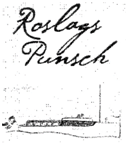1. Hechos.
La sociedad sueca Norrtelje Brenneri Aktiebolag registra en 2007 la marca “ROSLAGS PUNSCH” (mixta) para “bebidas alcohólicas” en clase 33:
Dicho registro se acompaña de una declaración de renuncia o disclaimer por el que se establece que «el registro no confiere un derecho exclusivo sobre el vocablo “RoslagsPunsch”. La inscripción de dicho disclaimer es exigido por la Oficina de Patentes y Registro sueca (en adelante PRV) como requisito necesario dado que el término “Roslags” remite a una región de Suecia y la palabra “Punsch” describe uno de los productos designados por dicho registro.
El 16 de diciembre de 2015, el Sr. Hansson solicita ante la PRV la marca nacional denominativa “ROSLAGSÖL” para “bebidas no alcohólicas y cervezas” en clase 32.
El 14 de julio de 2016, la PRV deniega la solicitud de marca “ROSLAGSÖL” por considerar que existe riesgo de confusión con la marca anterior ya que los signos designan productos idénticos o similares y comienzan con el término descriptivo “Roslags”, sin que la inclusión de otros vocablos o elementos figurativos sirvan para reducir la similitud entre ellos, dado que el vocablo “Roslags” en un elemento dominante de los signos.
El Sr. Hansson interpone un recurso contra la denegación ante el Tribunal de Primera Instancia, alegando la inexistencia de riesgo de confusión entre los signos y el hecho de que el término “Roslagen” se utiliza de forma habitual en signos distintivos de empresas establecidas en la región a la que dicho término hace referencia. El recurso es estimado concediéndose la solicitud de marca “ROSLAGSÖL”.
La PRV interpone un recurso de apelación contra la resolución ante el Tribunal de Apelación sueco. Este órgano jurisdiccional señala que, mientras que las disposiciones de Derecho material relativas a la protección de las marcas han sido objeto de armonización plena en virtud de la Directiva 2008/95, las normas de procedimiento son, en principio, competencia de los Estados miembros.
En estas circunstancias, dicho órgano suspende el procedimiento y plantea tres cuestiones prejudiciales ante el TJ, pues tiene dudas sobre si una disposición nacional (que permite introducir un disclaimer en el momento del registro de una marca) puede considerarse una norma de procedimiento, cuando es realmente sustantiva, pues tiene por efecto modificar los criterios sobre la base de los cuales ha de efectuarse la apreciación de la impresión de conjunto que produce la marca con el fin de examinar si existe riesgo de confusión, en aplicación del artículo 4.1.b) de la Directiva 2008/95.
Además, plantea si la referida norma nacional que tiene por efecto o bien (1) excluir el elemento de una marca compuesta al que se refiere dicha declaración o bien (2) atribuir a ese elemento de antemano y de manera permanente, una importancia limitada en el análisis de los factores pertinentes para determinar la existencia de un riesgo de confusión es contraria al artículo 4.1. b) de la Directiva 2008/95. En definitiva, pregunta al TJ si influye en la evaluación del riesgo de confusión, el hecho de que una marca anterior al registrarse haya sido objeto de una renuncia sobre alguno de sus elementos.
2. Pronunciamientos.
Las tres cuestiones prejudiciales se examinan de forma conjunta, resolviendo el TJ que la posible exclusión o atribución de una importancia limitada a un elemento descriptivo o no distintivo de una marca compuesta (mediante una declaración de renuncia) es incompatible con la legislación europea, dado que supondría una evaluación incorrecta del riesgo de confusión en el sentido del art.4.1. b) de la Directiva 2008/95.
La declaración de renuncia no puede influir en la apreciación global del riesgo de confusión, sino que debe evaluarse en relación con el signo en su conjunto y, por tanto, a la luz de todos sus elementos.
3. Comentario.
En esta sentencia, el TJ adopta una postura muy clara en relación con las declaraciones de renuncia, estableciendo que las “normas de procedimiento” nacionales que sean contrarias a las directrices de protección de la Directiva 2008/95 (como sucede con la legislación sueca, que permite excluir del registro los elementos que puedan generar incertidumbre sobre el alcance del derecho de exclusiva) no son admisibles desde la perspectiva de la normativa europea.
La sentencia confirma así la inadmisión de las declaraciones de renuncia o disclaimers que se prevén en el derecho nacional de algunos Estados Miembros (como Suecia, Irlanda, Letonia o Reino Unido) resolviendo que estas no pueden afectar a los objetivos y al espíritu de la normativa europea, debiendo garantizar las legislaciones nacionales las mismas condiciones de registro y la misma protección que las marcas de la UE.
Autor: Ana Pérez-Prat. Anuario Elzaburu, Edición 2019 (recopilatorio de comentarios de jurisprudencia europea en materia de Derecho de Propiedad Industrial e Intelectual que realiza Elzaburu).
Acceso al texto de la resolución: Sentencia del TJUE de 12 de junio 2019 proveniente de la base de datos NEO. Más información y posibilidad de probar gratuitamente el producto en https://www.efl.es/catalogo/bases-de-datos-juridicas-neo
Versión en inglés:
The role of disclaimers on descriptive or non-distinctive elements in complex marks when assessing likelihood of confusion. Judgment of the Court of Justice of 12 June 2019, Hansson (C-705/17), EDJ 2019/603562.
Background.
In 2007 the Swedish company Norrtelje Brenneri Aktiebolag registered the trademark “ROSLAGS PUNSCH” (& device) for “alcoholic beverages” in class 33:
The registration in question was accompanied by a disclaimer stating that "the registration does not give an exclusive right over the word "RoslagsPunsch". The registration of the said disclaimer was required by the Swedish Patent and Registration Office (hereinafter ‘the PRV’) in view of the fact that the term "Roslags" refers to a region of Sweden and the word "Punsch" describes one of the goods covered by the registration.
On 16 December 2015, Mr. Hansson applied to the PRV for registration of the national word mark “ROSLAGSÖL” for “non-alcoholic beverages and beers” in class 32.
On 14 July 2016, the PRV rejected the trademark application for “ROSLAGSÖL” on the grounds that there was a likelihood of confusion with the earlier mark since both signs refer to identical or similar goods and begin with the descriptive term “Roslags”. The office added that the inclusion of other words or figurative elements failed to reduce the similarity, in that the word "Roslags" is a dominant element of both signs.
Mr. Hansson lodged an appeal against the rejection before the Court of First Instance, arguing that there was no likelihood of confusion between the signs and that the term “Roslagen” is commonly used in distinctive signs of companies established in the region to which this term refers. The appeal was accepted and the trademark application for “ROSLAGSÖL” granted.
The PRV appealed against the judgment before the Swedish Court of Appeal, which noted that, while substantive rules on the protection of national trademarks are fully harmonised pursuant to Directive 2008/95, the procedural rules are, in principle, within the competence of the Member States.
In view of the circumstances, the Court of Appeal decided to stay the proceedings and refer three questions to the Court of Justice for a preliminary ruling, since it had doubts about whether a national provision (which allows a disclaimer to be entered on registration of a trademark) can be considered a procedural norm, when it is in fact substantive, since it has the effect of changing the criteria on which is based the global assessment to be carried out in order to examine the likelihood of confusion within the meaning of Article 4.1 b) of Directive 2008/95.
In addition, the court raised the question of whether the aforementioned national provision –which has the effect of either (1) excluding the element of a complex trademark to which the declaration refers or (2) attributing to that element, in advance and permanently, limited importance in the analysis of the relevant factors to be made in an assessment of the likelihood of confusion – is contrary to Article 4.1 b) of Directive 2008/95. In short, it asked the CJ whether the fact that an earlier trademark has been registered with a disclaimer on any of its elements could affect the assessment of likelihood of confusion.
Findings.
The three questions referred for a preliminary ruling are considered together, with the Court resolving that the possible exclusion or attribution of limited importance to a descriptive or non-distinctive element of a complex mark (by means of a disclaimer) is incompatible with European law, in that It would lead to an incorrect assessment of the likelihood of confusion within the meaning of Article 4.1 b) of Directive 2008/95.
A disclaimer cannot influence the overall assessment of the likelihood of confusion, which must be considered in relation to the sign as a whole and, as such, in the light of all its elements.
Remarks.
In this ruling, the CJ adopts a very clear position in relation to disclaimers, stating that national “procedural rules” that are contrary to the guidelines for protection set out in Directive 2008/95 (as occurs under Swedish legislation, which allows elements that may give rise to uncertainty about the scope of the exclusive right to be excluded from the registration) are inadmissible from the standpoint of European law.
The ruling thus confirms the inadmissibility of disclaimers present in the national law of some Member States (such as Sweden, Ireland, Latvia or the United Kingdom), resolving that they cannot be permitted to distort the objectives and spirit of European law, and that national laws must guarantee the same conditions of registration and the same protection as EU trademarks. Ana PÉREZ-PRAT.
ElDerecho.com no comparte necesariamente ni se responsabiliza de las opiniones expresadas por los autores o colaboradores de esta publicación










